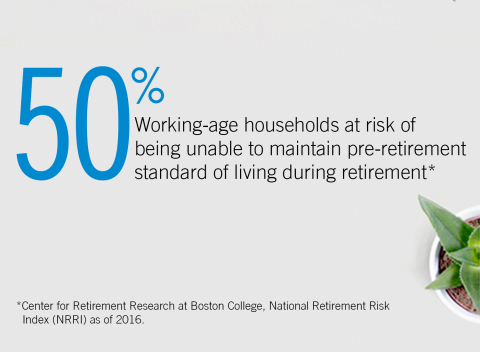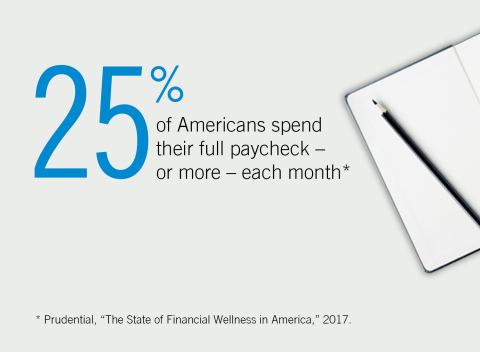NEWARK, N.J.--(BUSINESS WIRE)--Most Americans don’t have enough savings to cover unexpected expenses, tempting many to make the costly mistake of raiding their workplace retirement savings plans. Using after-tax contributions to an existing retirement plan to build savings that can be accessed to cover emergencies could help, according to Prudential Financial, Inc. (NYSE: PRU).
The need for emergency savings is so critical that it is a key feature of recently proposed bipartisan legislation, the “Strengthening Financial Security Through Short-Term Savings Act.”
Prudential cites the alarming statistics in a new white paper, “Increasing Financial Security with Workplace Emergency Savings”: 63 percent of Americans can’t afford a $500 emergency — the cost of minor car repairs — and 31 percent of employees would consider retirement plan loans or withdrawals to cover those expenses.1
In response, Prudential worked with Washington, D.C., nonprofit organization Prosperity Now to design a potential solution using payroll deductions to fund after-tax contributions. Prudential Retirement® is now offering this feature to plan sponsors as part of their holistic workplace financial wellness package. Financial wellness is realized when individuals adopt behaviors that help them manage day-to-day finances, achieve important financial goals, and protect against key financial risks.
“Making it easier for employees to build savings that can also be used in an emergency is the natural next step in the evolution of retirement plan design,” said Phil Waldeck, president of Prudential Retirement. “A small additional contribution each pay period may help build a financial cushion and reduce the effects of 401(k) plan withdrawals and loans that may cut into employees’ retirement savings and increase workforce costs for employers. For employees that never need to use it, the money eventually adds to their long-term retirement savings.”
The workplace benefits of an emergency savings feature
Emergency savings features through after-tax employee contributions offer advantages to employers and their employees.
Advantages for employees:
- Ready access to funds. Employees may be more willing to contribute to their retirement plans after-tax, since they can access these after-tax savings in an emergency when needed.2
- Peace of mind. Could reduce stress related to not having money for unexpected emergencies.
- Ease and flexibility. A convenient way to save at the workplace and track progress.
Advantages for employers:
- Optimize benefits spend. Plans are funded by employees and leverage existing infrastructure.
- Reduce leakage from retirement plans. Could help employees strengthen their day-to-day financial health which reduces the need to raid their pre-tax retirement savings in the event of an emergency.
- Mitigate the cost of delayed retirements. A one-year increase in average retirement age can raise workplace costs 1 to 1.5 percent for employers.3
- Improve employee engagement, morale and productivity. Nearly one in three employees say personal finances have distracted them at work.4
For more on emergency savings and Prudential’s emergency savings feature, read “Increasing Financial Security with Workplace Emergency Savings.”
About Prudential Retirement
Prudential Retirement delivers retirement plan solutions for public, private, and nonprofit organizations. Services include defined contribution, defined benefit and non-qualified deferred compensation recordkeeping, administrative services, investment management, comprehensive employee education and communications, and trustee services, as well as a variety of products and strategies, including institutional investment and income products, pension risk transfer solutions and structured settlement services. With more than 85 years of retirement experience, Prudential Retirement helps meet the needs of 4.3 million participants and annuitants. Prudential Retirement has $427.6 billion in retirement account values as of March 31, 2018. Retirement products and services are provided by Prudential Retirement Insurance and Annuity Company (PRIAC), Hartford, Conn., or its affiliates.
About Prudential Financial, Inc.
Prudential Financial, Inc. (NYSE: PRU), a financial services leader, has operations in the United States, Asia, Europe and Latin America. Prudential’s diverse and talented employees are committed to helping individual and institutional customers grow and protect their wealth through a variety of products and services, including life insurance, annuities, retirement-related services, mutual funds and investment management. In the U.S., Prudential’s iconic Rock symbol has stood for strength, stability, expertise and innovation for more than a century. For more information, please visit news.prudential.com.
1004721-00001-00
1 McGrath, Maggie, Forbes.com, “63% of Americans Don’t Have Enough Savings to Cover a $500 Emergency,” 2016. Prudential, “The State of Financial Wellness in America,” 2017.
2 After-tax contributions to emergency savings are free of taxes and penalties, but any earnings will generally be subject to taxes and a federal 10 percent penalty tax if withdrawn before age 59 1/2.
3 Prudential, “Why Employers Should Care About the Cost of Delayed Retirements,” 2016.
4 PwC, “Employee Financial Wellness Survey: 2017 Results.”








